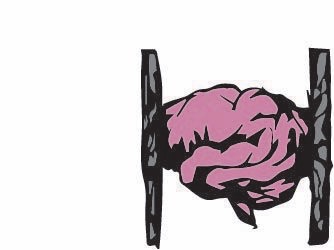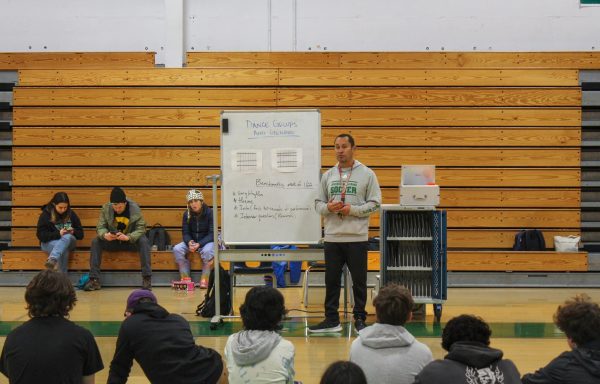Stress less: Students encouraged to find healthy balance of stress during Finals

Teenage brain being smashed because of the stress from finals week.
Across the nation, the purpose of a young person’s life is often shaped by one main activity: school. Although more colleges are reforming their admissions process due to challenges presented by COVID-19, cumulative exams and standardized testing can still seem to play a deciding role in the paths of many students. Among the most important of these exams are finals, which take place just before the semester’s end.
According to Archie Williams High School (AWHS) math teacher Natasha Krick, exams are a pillar of the school system and vital to students’ learning process, giving them the opportunity to utilize and showcase their individual learning. In Krick’s classes, final exams are usually worth around 20 percent of her students’ semester grades.
“When students are taking a test it requires them to assimilate their knowledge and understanding of something and it forces them to look for that information in their brain and that process of retrieving it in a testing situation allows it to go into their long term memory,” Krick said.
The week before finals, variations of “Quiet Week” exist in most high schools as a stress-relieving aid during which students prepare for the ever-so-dreaded exams. During this time, the AWHS Wellness Center hosts “Stress Less” week, complete with various activities to help students decompress.
According to Wellness Coordinator Danya Axelrad-Hausman, activities include friendship bracelet making, designing a button with encouraging messages, canine cuddles with a Wellness therapy dog, crafting a self care plan, and along with aromatherapy and coloring. Cocoa is also offered to give students a sweet escape.
The Wellness Center encourages students to take part in one or all of these activities if they are struggling to find a healthy outlet for excessive stress during Finals Week. However, AWHS Wellness Coordinator Katrina Southard believes that a controlled level of stress is important for students during Finals Week, as stress is an obstacle people will learn to balance throughout their lifetime.
“Life is full of things that are going to add some level of stress… So I think having some testing of that stress tolerance is helpful. For people who go to college, or get a job, or don’t go to college, getting used to that sense of a deadline and there being some follow-up that needs to happen in order to push through it,” Southard said.
It’s not that all stress is bad and we should try to alleviate it entirely, because I do think there’s some value in learning how to move through it, and what the skills are that you need in order to help.
— Katrina Southard
Contrary to the perception of stress as negative, it can contribute to increased productivity in manageable doses. According to Delphis Learning, when a person is stressed, a fight or flight reaction switches on and causes the brain to release hormones such as adrenaline and cortisol. These hormones make the body to be more reactive and alert, increasing productivity and communication from the brain. However, too much stress overloads the brain and can push the recipient into an unhealthy, panicked mindset – a common occurrence for students during Finals Week.
For Southard, students should learn to handle stress in school and later on in the workforce.
“It’s not that all stress is bad and we should try to alleviate it entirely, because I do think there’s some value in learning how to move through it, and what the skills are that you need in order to help. If you’re getting into that red zone, how do you get back into the yellow or green and what skills do you need for that?” Southard said.
Southard recommends that students find their own healthy way to alleviate stress. According to Southard, those methods can vary from student to student – some find listening to music as a strategy to decompress, while others may find a nature walk a more useful outlet. She cautions students not to use social media as an outlet, since she says it can be a time-consuming distraction that often does not help to alleviate stress. .
A full week of 2.5 hour-long finals often contributes to an unhealthy amount of stress in students, and can affect eating, sleeping, and exercise patterns. Furthermore, a survey published in 2014 by the American Psychological Association (APA) said that 81 percent of students reported school was a significant source of stress in their lives. Another survey by the APA said one third of surveyed teens reported feeling depressed or sad during the semesters’ end because of finals.
School-induced stress can also affect students beyond their mental state. The same APA survey found that a quarter of the students reported skipping a meal and over a third reported feeling tired, both because of stress. Providing similar results, a 2021 nationally conducted NBC survey said 83 percent of students accounted for having one or more physical health symptoms – such as difficulty sleeping, difficulty breathing, exhaustion, headaches, stomach problems, weight gain or loss – related to stress. These patterns of unhealthy behaviors are nothing new, and have continued among high school students in the last several years.
These health related issues may persist because students may not take the time to find strategies for decompression in such stressful times. As encouraged by the Wellness Center, it is important for students to not ignore stress-related symptoms that arise during Finals Weeks or other testing periods.
The pressure that is put on high school students is just way too much. It sometimes feels that if you don’t take at least a few AP classes and have multiple extracurricular activities then you are not doing enough. If you are not checking off certain boxes then you won’t get into any good colleges, — Lulu Flake
A NBC survey reported that students are four major areas of stress include grades and tests, overall workload, time management, and lack of sleep.
AWHS junior Lulu Flake believes the academic burden on high school students, especially around finals, is “too much” for students to handle.
“The pressure that is put on high school students is just way too much. It sometimes feels that if you don’t take at least a few AP classes and have multiple extracurricular activities then you are not doing enough. If you are not checking off certain boxes then you won’t get into any good colleges,” Lulu said.
According to Lulu, many students feel that the results of finals and the volume of school work they complete are the only ways to get into a desirable college. Like Lulu, 59 percent of students reported an increase of “college-related stress” since the fall of 2020 in the NBC survey.
Former AWHS principal Liz Seabury and other current staff constantly debate the effects of academic pressure – specifically excessive testing – on students. Seabury firmly believes that cumulative finals and consistent testing are not sound ways to evaluate a student’s learning process.
“What’s most beneficial for students [at the end of the semester] to talk about their accumulation of learning is not a gigantic, stressful two hour final,” Seabury said.
During final and midterm exam periods, Wellness urges students to manage their stress levels by utilizing the resources offered on campus (like Stress Less week activities and Wellness counselling) and being more proactive in self care practices.
Looking forward to this year’s Spring Finals Week and many more to come, educators and students continue to reflect on the academic pressure placed on students during these times. While some faculty still view testing as a sound way to gauge academic performance, many people at AWHS encourage students to prioritize their wellbeing.
Your donation will support the student journalists of Archie Williams High School. Your contribution will allow us to purchase equipment and cover our annual website hosting costs. Each donation will receive a magazine subscription for a year (6 copies a year), and become a part of the important work our publication is doing.
$35 -- Subscription to the magazine
$50 -- Silver Sponsorship
$75 -- Gold Sponsorship
$100 -- Platinum Sponsorship

Alice is a senior, starting her fourth year in journalism. She enjoys hanging out with her friends and her plants, and rewatching Parks and Recreation....

Genevieve is a junior, starting her second year in journalism. She enjoys reading, skiing, and watching movies from the 80’s. You can find her at home...

Neve is a sophomore, in her second year of journalism. She loves water and nature, reading, and hanging out with friends. You can find Neve in her room...











